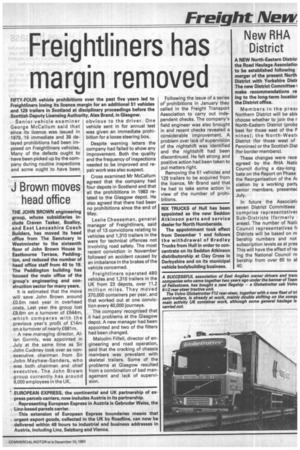Freightliners has margin removed
Page 17

If you've noticed an error in this article please click here to report it so we can fix it.
FIFTY-FOUR vehicle prohibitions over the past five years led to Freightliners losing its licence margin for an additional 51 vehicles and 129 trailers in Scotland at disciplinary proceedings before the Scottish Deputy Licensing Authority, Alex Brand, in Glasgow.
Senior vehicle examiner George McCallum said that since its licence was issued in 1979, 16 immediate and 38 delayed prohibitions had been imposed on Freightliners vehicles. Many of the defects ought to have been picked up by the company during routine inspections and some ought to have been obvious to the driver. One vehicle sent in for annual test was given an immediate prohibition for a loose steering box.
Despite warning letters the company had failed to show any improvement. Both the quality and the frequency of inspections needed to be improved and repair work was also suspect.
Cross examined Mr McCallum agreed that the company had four depots in Scotland and that all the prohibitions in 1983 related to the Glasgow depot. He also agreed that there had been no prohibitions since the end of May.
Leslie Cheeseman, general manager of Freightliners, said that of 13 convictions relating to vehicles and 1,310 trailers in the were for technical offences not involving road safety. The most recent conviction in November followed an accident caused by an imbalance in the brakes of the vehicle concerned.
Freightliners operated 480 vehicles and 1,310 trailers in the UK from 23 depots, over 11.2 million miles. They moved 370,000 containers per year, and that worked out at one conviction every 40,000 journeys.
The company recognised that it had problems at the Glasgow depot. A new manager had been appointed and two of the fitters had been changed.
Malcolm Filfell, director of engineering and road operation, said that the cracking of chassis members was prevelant with skeletal trailers. Some of the problems at Glasgow resulted from a combination of bad management and lack of supervision. Following the issue of a series of prohibitions in January they called in the Freight Transport Association to carry out independent checks. The company's field engineer was also brought in and recent checks revealed a considerable improvement. A problem over lack of supervision of the nightshift was identified and the nightshift had been discontinued. He felt strong and positive action had been taken to put matters right.
Removing the 51 vehicles and 129 trailers to be acquired from the licence, Mr Brand said that he had to take some action in view of the number of prohibitions.












































































































